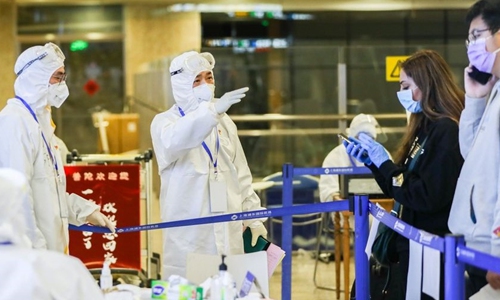SOURCE / INDUSTRIES
Empty Canadian planes flying back from China deemed accidental amid congested airport traffic

Staff members check the information of passengers entering China at the Pudong International Airport in Shanghai, east China, March 18.Photo:Xinhua
China's Foreign Ministry on Wednesday said that Western media reports of empty Canadian chartered planes flying back from China are "inaccurate" and China never restricted the approval of Canadian chartered flights or the duration of their stay.
The comments came as Canadian CBC News reported that two cargo planes chartered by the Canadian federal government and a provincial government to take medical supplies from China returned with no cargo on board, citing ground congestion at Shanghai Pudong International Airport.
Western media reports are not accurate, Geng Shuang, spokesperson of the Chinese Foreign Ministry, told a press briefing on Wednesday. "Chinese airports and regulators didn't restrict Canadian chartered planes or the duration of their stay at the airport," he said.
Since the coronavirus outbreak, China and Canada have supported and helped each other to cooperate in the fight against the disease, Geng said.
Recently, the Canadian side came to China to purchase medical supplies via various channels and sent chartered planes to carry the goods from Shanghai, for which China actively offered assistance and convenience in purchasing and arranging for the charter planes' approval, Geng said. "Canada repeatedly expressed gratitude," he said.
Reports of empty planes returning to Canada were deemed to reflect surging numbers of international cargo jets arriving at Shanghai airports amid strict implementation of quarantine measures there, an expert said on Wednesday. He called for more understanding from Canada regarding China, which has made steadfast efforts to export urgently needed medical supplies to help fight many countries fight the coronavirus pandemic, even as it faces the pressure of rising imported cases.
The incident is regrettable but understandable, Wang Yanan, chief editor of the Aerospace Knowledge magazine, told the Global Times on Wednesday. "It happens that a cargo plane has to leave a parking bay for the next plane if its products can't be loaded on time. The company responsible for Canada's medical supplies should better coordinate landing time and the time when its goods could be delivered to the airport," he said.
Like other airports that are used to handling more passengers than cargo, Shanghai Pudong International Airport also can't handle surging numbers of cargo planes within a short time span, Wang said, noting that the airport is now facing great pressure of rising cargo planes traffic.
Many countries are rushing to deliver urgently needed medical products from the world's largest supplier. From April 10-17 alone, the airport saw its daily number of cargo flights break records five times over, from 287 to 329, airport data showed.
In March, the Pudong airport has handled an average of over 200 cargo flights each day, already exceeding the volume during the same period last year, according to its operator the Shanghai Airport Authority. For medical supplies alone, the airport has shipped over 10,000 tons of cargo already.
In total, 90 global airlines have operated cargo flights at the Shanghai Pudong International Airport, covering 40 countries and regions across five continents. Almost all of the 58 parking bays at the airport are now occupied, while freight workers are laboring around the clock to accelerate the process.
And, 40 to 50 percent of the passenger jets have been converted to deliver protective supplies, which require manpower three or four times that previously needed.
To solve the problem, the Shanghai airport has devised a series of measures, including a space expansion of 12,000 square meters for on-the-ground operating equipment to promote efficiency and re-arranging some cargo flights to daytime hours so as to make better use of plane stands and provide convenience for cargo delivery.
Wang said big data technology could be used to improve the coordination and management of cargo flights and to improve processing efficiency.


